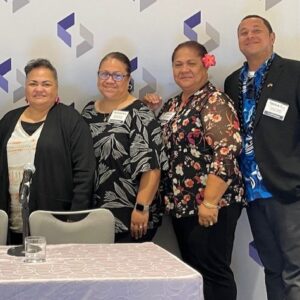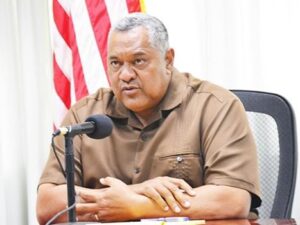
American Samoa is working to address behavioral health and workforce needs in several ways. In 2021, Governor Lemanu P.S. Mauga identified addressing the drug epidemic in American Samoa as a top priority for his administration to build on progress made under previous administrations. The National Governors Association Center for Best Practices (the NGA Center) launched a yearlong Stimulant and Polysubstance Use Policy Academy to support states and territories, including American Samoa, in adopting more comprehensive policy approaches in response to stimulant polysubstance use challenges.
An NGA policy academy is a yearlong opportunity for states and territories to assess their current operating environment, share successes and best practices, learn from experts, exchange ideas with other states and territories, and develop and execute an action plan to achieve program and policy changes based on identified jurisdictional goals. The NGA Center worked with core teams that were made up of representatives from the Governors’ offices, alcohol and drug abuse directors, Medicaid directors, senior health and public health agency leadership, state opioid coordinators, state administering agencies, and other policymakers and stakeholders.
American Samoa’s overarching goal for the policy academy centered on a new framework through which all substance use planning and policies would flow to coordinate across agencies and align territorial systems.
Project Goals
Leading into the policy academy, American Samoa identified the following goals:
- Develop a robust governance framework for the coordination of agency silos, with a charge to improve communication among stakeholders and align missions with the framework and legislation.
- Ensure relevant cross-agency information sharing is coordinated, making use of digital tools and technology to inform data-driven decision making, policy recommendations, and promote education and awareness campaigns to reach diverse audiences.
- Conduct a review of available funding streams to utilize existing funding more effectively and increase funding by leveraging or appropriating territory dollars and securing private funds.
Action Planning

The project team decided early on that the starting point of the action planning process would be the creation of a framework through which other goals could be accomplished. The Governor and his staff envisioned a commission that would include membership from various territory agencies and offices, the Governor and his office, community organizations and other subject matter experts who would be charged with serving as a coordinating body to organize a comprehensive substance use initiative. As a result, Governor Mauga signed Executive Order 003-2022 on May 12, 2022, establishing the Comprehensive Substance Abuse Council (CSAC). Through this council, the other goals identified by the project team related to cross-agency information sharing, data coordination and funding were reviewed, and a plan was put in place to address these issues through its work plan.
At the July 3, 2022, opening of the first convening of the CSAC, leadership from villages and religious institutions were invited to participate in the meeting, and the Governor issued a call to action for core institutions at the village-level to take part in the ownership of the territory’s substance use challenges and offer solutions. The religious and village leaders were identified as a crucial component of the council’s work given their influence on village-level policies and community norms.
The commission established committees focused on education and outreach, enforcement and investigation, and rehabilitation and treatment and included members of the policy academy project team from the Governor’s office and related health agencies to ensure alignment of the project goals with the commission’s work. The CSAC began quarterly meetings in November 2022 to continue discussion of relevant issues related to substance use in American Samoa and offer possible solutions. One of the first accomplishments of the CSAC was the transition and consolidation of Behavioral Service Programs from the Department of Human and Social Services to the Department of Health.
Technical Assistance
During the policy academy, NGA provided technical assistance to American Samoa on the following topics to support the development of their comprehensive plan:
- Faith-based, culturally informed harm reduction approaches that included a peer-to-peer learning call with Connecticut and the Imani Project on faith-based treatment programs;
- Housing harm reduction for methamphetamine use;
- Funding models for short term inpatient treatment center and ways to utilize the center for incarcerated populations;
- Tribal and culturally responsive treatment programs;
- Health department consolidation strategies;
- Contingency management models; and
- Stigma reduction for treatment of substance use disorder (SUD).
“Given the importance of faith-based organizations in our community, having the opportunity to hear from and learn more about the Imani Project helped us visualize what similar faith-based programs might look like for our territory.”
American Samoa Project Team
Providing technical assistance to address healthcare workforce shortages was another helpful resource for the project team. In addition to a desire to construct a new behavioral health facility, the ability to attract and retain qualified and well-trained behavioral health providers and staff to carry out the work became another focus area for future development. While ongoing recruitment efforts from outside of the territory from neighboring countries and from the United States mainland may provide a short-term solution, there is a need to further develop the pipelines and local workforce in fields across the board to include healthcare, public administration, public policy, law, finance/accounting and other science, technology, engineering, arts, and mathematics related fields. As a result, NGA invited American Samoa to join the Next Generation of the Healthcare Workforce Knowledge Exchange Network so the team could receive technical assistance, resources and engage in peer to peer learning to support the work started through the CSAC. Project teams in the network are working to implement strategies to strengthen and grow the healthcare workforce.
Outcomes
The outcomes from the policy academy include:
Goal #1 – Governance
- Creating and establishing the Comprehensive Substance Abuse Council (CSAC) through Executive Order 003-2022 to provide a comprehensive approach to substance abuse issues.
- Developing clear goals and steps to achieve sustainable implementation of the CSAC and related work to find further solutions and approaches to address issues related to substance use and guide the work of the CSAC committees, while leveraging the staff and measuring progress through the policy academy.
- The CSAC also provides an infrastructure to disperse opioid settlement funds to support the territory’s goals of rehabilitation and treatment, enforcement and investigation, and education and outreach.
- Consolidating the Department of Human and Social Services Behavioral Services and the Department of Health into the Territorial Behavioral Health Services to improve efficiency of substance use programs and reduce stigma related to the treatment of substance use disorders.
- This consolidation aims to improve efficiency regarding the provision and awareness of substance abuse programs that have long been siloed, fragmented and even duplicated at both the Department of Human and Social Services and the Department of Health. It also presents an opportunity to address these issues in tandem from a public health lens and reduce stigma.
Goal #2 – Data
- Development of a $6 million digital system/portal owned by the American Samoa Government (previously known as TalofaPass) and used to monitor travel entries during the COVID-19 pandemic as a centralized government system or portal. The vision of the Lemanu-Talauega Administration for this system is to streamline otherwise fragmented territory approvals/requirements, promote collaboration and data sharing, and transition the territory to e-Government.
- Organizing, compiling and communicating data as a result of the work done to break down siloes among agencies (law enforcement, LBJ hospital, etc.)
- Planning for a data committee through discussion with the CSAC to focus solely on addressing the identified data challenges identified in the action plan. The project team prepared a report and summary from the policy academy that was shared at the committee level and with the CSAC Chair on this topic. Data continues to be housed by various territory departments and remains fragmented. In addition, each department manages their data differently resulting in large amounts of data that can be difficult to both extract and analyze. Finding the appropriate technology and systems to house and enable sharing and collaboration across the government is an ongoing effort. Further, communicating that data effectively to relevant stakeholders is another challenge.
Goal #3 – Funding
- Securing a $7.4 million supplemental budget request from the Governor to the Territorial Legislature (Fono) of which $500,000 will be allocated to the CSAC.
- Having the resources and funding to support the work of the council is critical. Funding will allow the council to hire additional staff whose sole purpose is to coordinate and sustain the work of the CSAC.
- Obtaining $16 million in American Rescue Plan Act (ARPA) funds allocated for the territory’s first ever rehabilitation and treatment facility.
The sustainability of the work initiated during the policy academy was at the forefront of American Samoa’s efforts, ensuring that the conversations and exchange between departments continued even after the policy academy ended. One of the goals of the CSAC includes transitioning the work, challenges and successes from the policy academy experience into the long-term work plan of the CSAC as it develops. Having an action plan that provides clear goals and steps to get closer to the stated goals will allow the council and its committees to continue the work initiated by the policy academy and provide further solutions and approaches to action items that are still pending. More information on the policy academy outcomes can also be found in the summary report State and Territory Approaches to Improving Care for Individuals Affected By Stimulant and Polysubstance Use.
American Samoa has continued to focus on bolstering behavioral health services and the health workforce more broadly. The territory is participating in the NGA Center’s Next Generation of the Healthcare Workforce Knowledge Exchange Network. The NGA Center has been convening this group to share best practices and lessons learned for addressing workforce challenges.
American Samoa is working to address a nursing shortage and has several goals to strengthen its healthcare workforce. The territory is working to:
- Recruit healthcare workers while maintaining high training standards,
- Encourage more American Samoans to enter the medical field through career paths and scholarships,
- Retain healthcare workers for longer periods of time and
- Evaluate healthcare workforce programs.
American Samoa continues to participate in the Knowledge Exchange Network and work toward advancing its healthcare workforce goals. Strengthening the healthcare workforce also contributes to the territory’s priorities related to behavioral health. By recruiting and retaining a well-trained workforce, Governor Mauga and his administration are advancing quality healthcare for American Samoans and leading the way with innovative responses to behavioral health and healthcare workforce policies.
This article was developed by Anna Heard and Shelby Hockenberry, for more information on Governors’ work on behavioral health and healthcare workforce issues please contact: communications@nga.org.












